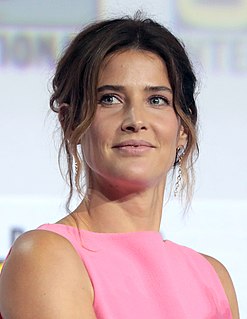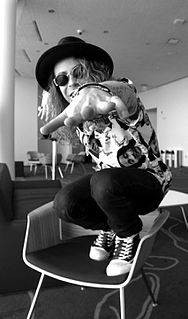A Quote by Cobie Smulders
When you're doing a movie, it's finite - you have a trajectory of where your character's going, and you follow that. Then the storybook closes.
Related Quotes
People say, 'Well, whose career do you follow? Where do you see your career going? What movie do you want to do next?' And I can't tell you what type of movie I would go and do next. I would have to read the script and feel for a character. And if I feel in my gut for a character, I know that that's somebody I have to play.
I feel like at the end of your days, the last thing that's going to happen is that you're going to watch the movie of your life. It's very important to make sure that you love your movie and that you want to watch your movie, so I try to always make sure that I'm doing something fun and interesting.
Just always believe in yourself. "Champions adjust." It's a line I learned from Billie Jean King, and sometimes your dream adjusts. Be willing to adjust with it and see where your opportunities ... sometimes a door closes but a window opens, so just follow your dreams and continue. You never know where it's going to take you.
I went to London to do the stuff. I was like "What am I going to do? What's going to happen?" But then once you start working, you forget all that and you start enjoying what you're doing. Once you enjoy the process, you know that people are going to do the same thing. If you don't enjoy it and just do it like a job, then it's going to be feel that way. That's my theory of doing a movie.
Any movie you see, if Tom Cruise is in an action movie or whatever it is, The Avengers, there's going to be a kick-ass female character. Usually one. And there's a term for this, but I don't know what it is. But someone's coined a term where there's one female character who's incredibly tough and strong and just as good as the guys at whatever it is they’re doing, and usually wearing black, skin-tight clothes, and [she] has no personality whatsoever, and is not funny.
To follow Jesus implies that we enter into a way of life that is given character and shape and direction by the one who calls us. To follow Jesus means picking up rhythms and ways of doing things that are often unsaid but always derivative from Jesus, formed by the influence of Jesus. To follow Jesus means that we can't separate what Jesus is saying from what Jesus is doing and the way that he is doing it. To follow Jesus is as much, or maybe even more, about feet as it is about ears and eyes" (The Way of Jesus, Eugene H. Peterson, 22).
Comic books sort of follow with the move - if people see the movie and if they're interested in the character and want to see more of the character, they start buying the comic books. So a good movie helps the sale of the comic books and the comic books help the movie and one hand washes the other. So, I don't think there's any reason to think that comics will die out.
The first thing that happens is the cleansing of the former character. I don't think a lot of actors talk about it, but there is usually a process where you essentially purge yourself of the character played prior to the movie. Then you want to think about what the character represents, and you write down all of the elements about this character and then take the time to find some synchronicity and start breathing the character.



































